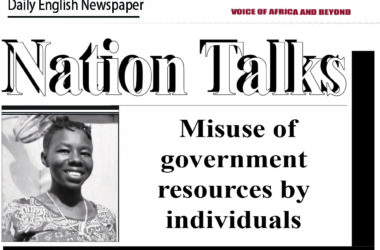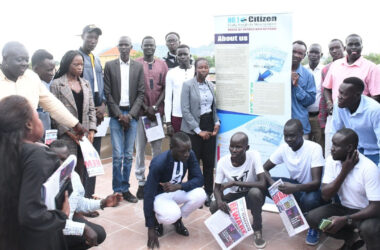By Kiden Stela Mandela
South Sudan is amongst the richest countries in the world endowed with abundant natural resources, yet the citizens are trapped in abject poverty.
God has blessed our country with oil, gold, diamonds, cement, copper and fertile soil for agricultural development, with which there would never be an issue of scarcity and borrowing, non-existent vocabulary.
But this country’s corruption is beyond the limit of its nature, borrowing has become the order of the day, and sadly, South Sudan still feeds on donations.
Above all, South Sudan, in a day, produces 150,000 barrels of oil apart from other sources but still keeps on borrowing and surviving on donations. The question is, where does the money obtained from the oil, Gold and other resources go? Is it to individual packets or kept outside the country?
The communities do not get either 2% or 3% of the revenue from the querying sectors, no good schools, hospitals and so forth.
I really don’t understand which school; our politicians got their degrees from. They don’t think of developing the country but enjoying well-developed countries that always work for their interest, not for the people.
South Sudanese citizens in exile are suffering yet the politicians hear their voices like a comedy. Floods are threatening the lives of our people, but the leaders enjoy travelling out of the country, day and night. It’s very hard to survive in the country.
Corruption of any nature is an illegal practice that deprives the rights and needs of one another. It normally comes in when there are no well-established systems or institutions characterized by a bad culture of governance and greed for wealth. It is a major threat to the prosperity of any society, and the reason for underdevelopment and poverty.
Corruption lacks a unified definition because of the complexities, and the ways it’s done by anyone who feels to cheat the other. It involves abuse of public office for personal interests, bribery, fraud, embezzlement, deception, illicit dealings, and so on. The government has a big role in fighting corruption but is also vulnerable to corruption itself if there is no sound leadership and public institutions in place.
The dynamics of corruption in South Sudan have two folds; the first is bottom-up, where low officials are involved in the practices and then share the proceeds with the high-ranking officials. And the high-ranking officials plan and direct the low officials to execute the corruption practices while keeping the interest shares of both. In these cases, top officials guarantee protection from firing, and prosecution if the issue arises in the public domain. And it’s one of the conditions for employing or appointing an official because it has been institutionalized.
I’m requesting our leaders to make use of the money from the oil, and gold to sponsor other programs and should not stick to donations or loans because it will be a burden to the upcoming generations.
Our leaders should take examples of other countries just like Uganda and Kenya who do not have such resources but have developed. If this spirit continues, we don’t know what will happen, or maybe the country will be given out for paying credits.
God Bless South Sudan.
Be right there!



